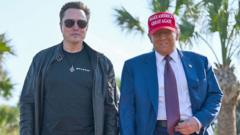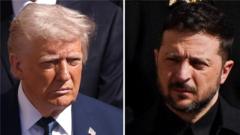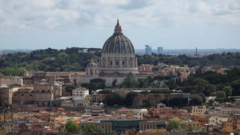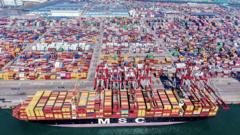### Summary: South Africa finds itself in a precarious position following President Trump’s decision to freeze nearly $440 million in aid, citing the country’s land reform policies and allegations concerning its international actions. The situation has led to heightened tensions, raising fears over future economic consequences
### Title: Tensions Rise Between South Africa and the US Following Trump's Aid Freeze

### Title: Tensions Rise Between South Africa and the US Following Trump's Aid Freeze
### Description: The diplomatic relationship between South Africa and the US faces new challenges as President Trump's freeze on financial aid raises concerns about trade and regional stability.
South Africa seems to be at a pivotal moment as its relationship with the United States faces increased strain due to President Trump's recent decision to suspend financial aid. Trump's assertion that South Africa is engaging in "unjust and immoral practices" against the Afrikaner community and its actions in filing a genocide case against Israel at the International Court of Justice (ICJ) have sparked alarm within the nation.
Experts warn that this could lead to more severe repercussions, such as risking South Africa’s access to the US market under the Africa Growth and Opportunity Act (Agoa) — a critical trade program for many African nations. Historically, the US and South Africa maintained a generally amicable relationship since the end of apartheid in 1994. However, tensions have been mounting recently.
The conflict escalated further after South African President Cyril Ramaphosa enacted the Expropriation Bill, which allows for land confiscation without compensation. This legislative action prompted Trump's response, where he condemned it and signed an executive order freezing significant aid funds — reportedly around $440 million allocated for 2023. The US embassy later clarified that funding related to the Pepfar program aimed at tackling HIV/Aids would not be completely halted, although some initiatives may still be affected.
Trump characterized South Africa’s government as having a "shocking disregard" for citizen rights and making aggressive moves against the US. In addition to freezing aid, he extended an offer to assist Afrikaner refugees seeking to relocate to the US, which directly appeals to groups advocating for the repeal of race-based laws like affirmative action.
The ongoing land reform debate has drawn the ire of Trump before; he previously claimed that South Africa’s government engaged in widespread violence against farmers. Analysts note that the current aid freeze introduces an unprecedented level of tension with concrete actions, unlike previous verbal criticisms from Trump during his presidency.
Both countries are now considering their options in light of this development. While the US is among South Africa’s significant trade partners, it is not the most pivotal, with ongoing deals generating substantial revenue in minerals and goods under Agoa. Yet, the potential for losing this preferential access looms over South Africa as Trump appears to view this moment as an opportunity to assert US interests.
Domestic reactions suggest concern about the diplomatic fallout. South Africa’s Foreign Minister, Ronald Lamola, reaffirmed their commitment to the ICJ case against Israel, stating that standing by principles has its consequences, which may further complicate relations. Meanwhile, Ramaphosa has announced plans to enhance South Africa’s international standing, with a focus on rebuilding ties, though US Secretary of State Marco Rubio’s recent snub indicated growing discord.
Moreover, South Africa’s involvement in Brics — a coalition challenging Western dominance — emphasizes its need to seek alternative partnerships amid these tensions. While the European Union maintains its support for South Africa, experts believe the nation must strategize effectively to navigate its complex diplomatic landscape, especially with Trump at the helm. Ultimately, South Africa’s government will need to employ careful negotiation tactics and consider its natural resources as critical leverage in this unfolding geopolitical chess match.
Experts warn that this could lead to more severe repercussions, such as risking South Africa’s access to the US market under the Africa Growth and Opportunity Act (Agoa) — a critical trade program for many African nations. Historically, the US and South Africa maintained a generally amicable relationship since the end of apartheid in 1994. However, tensions have been mounting recently.
The conflict escalated further after South African President Cyril Ramaphosa enacted the Expropriation Bill, which allows for land confiscation without compensation. This legislative action prompted Trump's response, where he condemned it and signed an executive order freezing significant aid funds — reportedly around $440 million allocated for 2023. The US embassy later clarified that funding related to the Pepfar program aimed at tackling HIV/Aids would not be completely halted, although some initiatives may still be affected.
Trump characterized South Africa’s government as having a "shocking disregard" for citizen rights and making aggressive moves against the US. In addition to freezing aid, he extended an offer to assist Afrikaner refugees seeking to relocate to the US, which directly appeals to groups advocating for the repeal of race-based laws like affirmative action.
The ongoing land reform debate has drawn the ire of Trump before; he previously claimed that South Africa’s government engaged in widespread violence against farmers. Analysts note that the current aid freeze introduces an unprecedented level of tension with concrete actions, unlike previous verbal criticisms from Trump during his presidency.
Both countries are now considering their options in light of this development. While the US is among South Africa’s significant trade partners, it is not the most pivotal, with ongoing deals generating substantial revenue in minerals and goods under Agoa. Yet, the potential for losing this preferential access looms over South Africa as Trump appears to view this moment as an opportunity to assert US interests.
Domestic reactions suggest concern about the diplomatic fallout. South Africa’s Foreign Minister, Ronald Lamola, reaffirmed their commitment to the ICJ case against Israel, stating that standing by principles has its consequences, which may further complicate relations. Meanwhile, Ramaphosa has announced plans to enhance South Africa’s international standing, with a focus on rebuilding ties, though US Secretary of State Marco Rubio’s recent snub indicated growing discord.
Moreover, South Africa’s involvement in Brics — a coalition challenging Western dominance — emphasizes its need to seek alternative partnerships amid these tensions. While the European Union maintains its support for South Africa, experts believe the nation must strategize effectively to navigate its complex diplomatic landscape, especially with Trump at the helm. Ultimately, South Africa’s government will need to employ careful negotiation tactics and consider its natural resources as critical leverage in this unfolding geopolitical chess match.






















